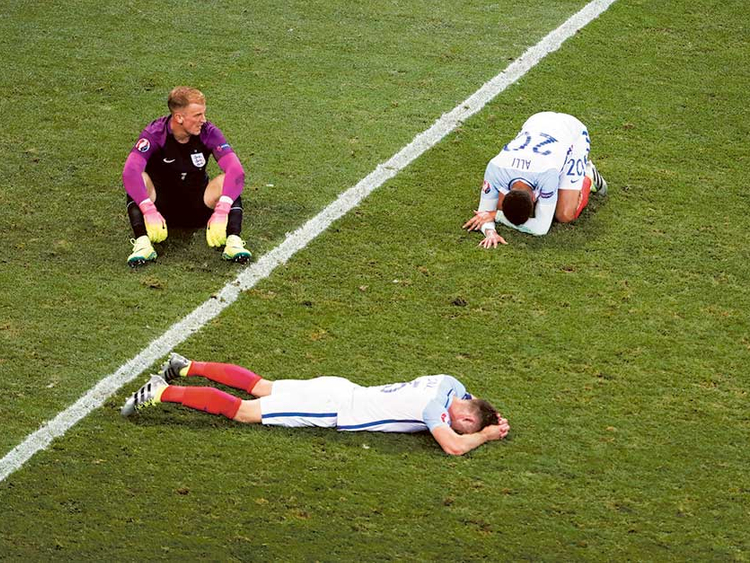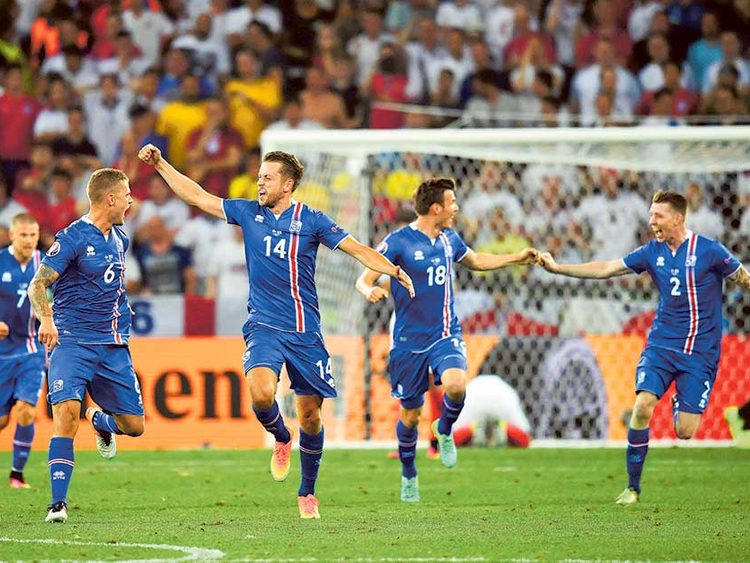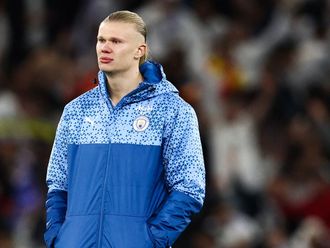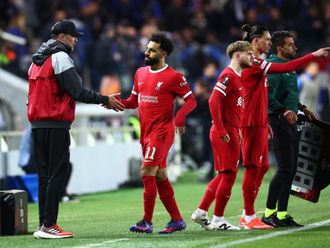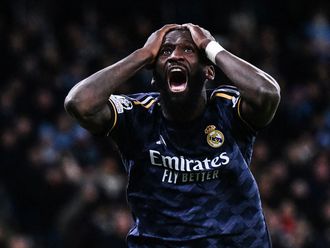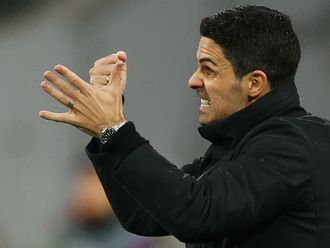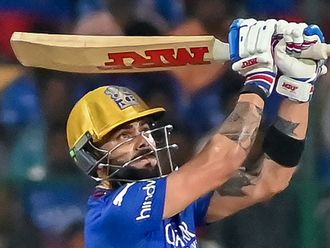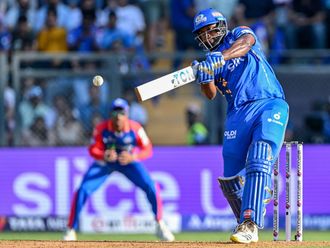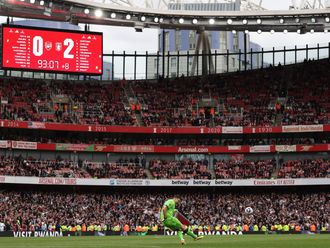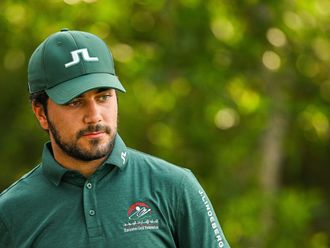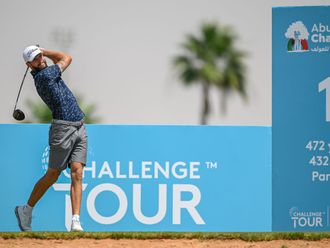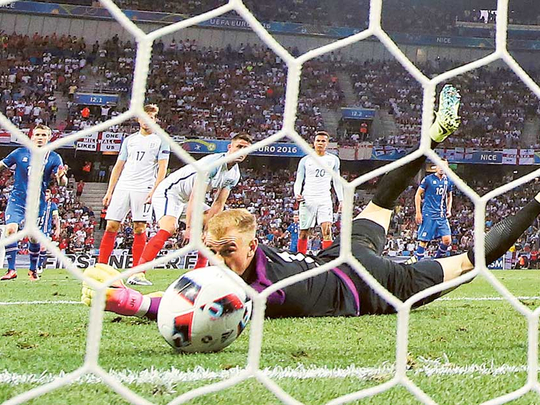
Nice: They say one night in Paris is like a year in any other place. Well, a night in Nice can be pretty eventful too, if you end up chasing a game against tournament debutants with a population of just 330,000 but a mighty spirit.
This game, in which England should have been able to assert their Premier League pedigree (however much Iceland’s progress is lauded), turned into a draining battle to avoid the most mortifying defeat in the country’s football history. The other aim was to earn a quarter-final tie against France in Paris on Sunday. But for England a much more urgent mission loomed. It was to avoid a lifetime of ignominy.
The stand-out upset in England’s 66-year international story is the USA’s 1-0 win in a group stage game in Belo Horizonte in the 1950 World Cup. But defeat in Nice was always going to be a deeper trauma, because 1950 was the earliest year of England’s international history, before the Premier League grew into a global industry.
Here, a 49 million pounds (Dh239.9 million) left-sider, Raheem Sterling, went toe-to-toe with Birkir Saevarsson, 31, who is currently employed by Hammarby in Sweden. Before that it was Valur and Brann.
In England’s midfield, Wayne Rooney made his 115th appearance, joining David Beckham as England’s most capped outfield player, 10 short of goalkeeper Peter Shilton. Rooney’s counterpart as captain was Aron Gunnarsson of Cardiff City. These disparities were fun to consider. By this stage, though, international tournaments are meant to strike down romantic tales in favour of ability and power.
Thus we saw Germany smash Slovakia and Belgium wipe Hungary off the chart. The last 16 is the stage when the rich countries ought to be taking over and there could be no excuse on earth for England going out to Iceland.
Rooney, Kyle Walker, Danny Rose, Dele Alli, Harry Kane and Sterling all returned to the starting eleven as Roy Hodgson stuck to his policy of treating most of this squad as interchangeable. Nathaniel Clyne, Ryan Bertrand, Jordan Henderson, Jack Wilshere, Adam Lallana and Jamie Vardy dropped out.
Iceland’s joint-coaches Lars Lagerback and Heimir Hallgrimsson on the other hand fielded the same starting eleven for the fourth consecutive game. If fatigue was a possible hindrance for the darlings of this tournament, it was hardly visible in an 18-minute opening spell that showed why England’s defending had been their big pre-tournament worry.
The game started with a smooth affirmation of England’s higher status: a Rooney penalty after Iceland’s goalkeeper had tripped Raheem Sterling. So England were ahead inside two minutes. Finally, they were pressing on early with the job of dispatching a lesser name. But then the volcano blew.
A long throw by Aron Gunnarsson – hardly a secret weapon – found the head of Kari Arnason, who flicked it on for Ragnar Sigurdsson to equalise.
England’s lead lasted less than four minutes and soon they were behind. While Gylfi Sigurdsson slipped the ball to Kolbeinn Sigthorsson, England’s centre-backs watched with all the rapt detachment of theatre goers. Joe Hart, in England’s goal, could manage only a weak push at the ball and watched it trundle across his goal-line.
So much of the pre-tournament talk had been about England’s vulnerability at the back. But Hart’s poor goalkeeping has been a shock. His inability to keep out Gareth Bale’s free-kick in the Wales game was marked down as an aberration. For him to repeat the mistake two games later suggests a deeper loss of form, of strength and timing. Equally Sigthorsson should never have been allowed so much time to shape his shot.
Another England pattern then asserted itself. On the edge of Iceland’s penalty box they bounced off the opposition’s defence, as they had against Slovakia. They lacked subtlety and composure to penetrate the gaps or turn their opposite numbers. This is a routine task in the Premier League but somehow it was beyond England for the rest of the first half. Kane and Rooney especially resorted to long-range punts.
Sturridge was playing his part, wide right, but Sterling was again failing to impose himself on the left. This formation, with one central striker, and two wider forwards, is Hodgson’s favoured system, but not once has it established consistent English domination.
After the interval Eric Dier gave way to Jack Wilshere, who was off the pace against Slovakia and could find no rhythm in his passing. Once again in this game we saw England’s all time leading scorer (Rooney) taking corners and the Premier League’s No 1, Kane, curling in free-kicks. The second-half’s first flash of ingenuity however came in England’s penalty area, with a bicycle-kick by Ragnar Sigurdsson that Hart managed to slap away.
Vardy’s arrival in place of Sterling on 59 minutes confirmed Hodgson’s inability to see that England’s most expensive footballer (Sterling) is shot to bits, in his confidence and his touch. It was a shame that Hodgson refused to show similar faith in Vardy, who runs behind defences rather than shuttling the ball around in front of them, which too many of these England players do.
At the end of turbulent and upsetting week in the political sphere back home, England’s footballers turned an enticing second-round tie into an ordeal for their followers, who had to watch them chase a game against Iceland from the 18th minute on. We should pause a moment to say: if only England had Iceland’s qualities.


